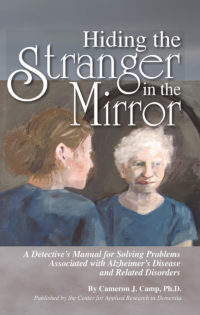Below are dementia-related resources mentioned in Hiding the Stranger in the Mirror: A Detective’s Manual for Solving Problems Associated with Alzheimer’s Disease and Related Disorders.
You Solve The Case
Answers to Unsolved Cases
In Hiding the Stranger in the Mirror, readers are given tools and resources to understand why persons with dementia do what they do, to help them solve their own “cases,” and, more importantly, they are given a more hopeful way of thinking about Alzheimer’s disease and those who live with it.
To read the unsolved cases and their answers, click each individual link below.
- Doing God’s Work
- Don’t Water the Plants
- Hand to Mouth
- I Hate Her
- I Know You’re In There
- I’m Bored!
- I’m Not Your Mother
- Orange Juice Tossing
- Take it Back
- The Cleaning Lady
- The Pill
- What!?!
Global Deterioration Scale
Reading Test
Help Persons with Dementia Stay Connected to the World
- Camp, C. J., Zeisel, J., & Antenucci, V. (2011). Implementing the “I’m Still Here Approach”: Montessori methods for engaging persons with dementia. In P. E. Hartman-Stein & A. La Rue (Eds.) Enhancing cognitive fitness in adults, (pp. 401-417). New York: Springer.
Identifying Pain in Dementia
Ideas for Activities
- Camp, C. J., Schneider, N., Orsulic-Jeras, S., Mattern, J., McGowan, A., Antenucci, V. M., Malone, M. L., & Gorzelle, G. J. (2006). Montessori-based activities for persons with dementia: Volume 2. Beachwood, OH: Menorah Park Center for Senior Living.
- Camp, C. J. (Ed.). (1999). Montessori-based activities for persons with dementia: Volume 1. Beachwood, OH: Menorah Park Center for Senior Living. (translated into Spanish, Greek, Korean, Japanese, and Mandarin as of Oct. 2009)
- Joltin, A., Camp, C. J., Noble, B. H., & Antenucci, V. M. (2005). A different visit: Activities for caregivers and their loved ones with memory impairment. Beachwood, OH: Menorah Park Center for Senior Living.
Visit our Free Resources page and follow our social media (Facebook ▪ LinkedIn ▪ Twitter) where we share sample activities from these manuals periodically.
Delirium vs Dementia
RAMP / Reading and Discussion Groups
- Skrajner, M. M., Haberman, J. L., Camp, C. J., Tusick, M., Frentiu, C., & Gorzelle, G. (2012). Training nursing home residents to serve as group activity leaders: Lessons learned and preliminary results from the RAP project. Dementia, 11: 263-274.
- Skrajner, M. J., & Camp, C. J. (2007). Resident-assisted Montessori programming (RAMP™): Use of a small group reading activity run by persons with dementia in adult day health care and long-term care settings. The American Journal of Alzheimer’s Disease & Other Dementias, 22(1), 27-36.
- Camp, C. J., & Skrajner, M. J. (2004). Resident-assisted Montessori programming (RAMP): Training persons with dementia to serve as group activity leaders. The Gerontologist, 44, 426-431.
Browse our current Reading Roundtable® selection in our web store.
Download instructions, labels, and examples to create your own Leader Versions of Reading Roundtable® Books on our Free Resources page.
Memory Books
- Memory Books and Other Graphic Cuing Systems: Practical Communication and Memory Aids for Adults with Dementia. By Michelle S. Bourgeois, Ph.D., CCC-SLP ©2007. Health Professions Press.
A Different Visit
Based on the book A Different Visit: Activities for Caregivers and their Loved Ones with Memory Impairment
Spaced Retrieval
- Camp, C. J. (2006). Spaced retrieval: A case study in dissemination of a cognitive intervention for persons with dementia. In D. Koltai Attix & Kathleen A. Welsch-Bohmner (Eds.) Geriatric neuropsychological assessment and intervention (pp. 275-292). New York: The Guilford Press.
A new edition and an online course are being planned for the future. Join our mailing list or follow us on social media (Facebook ▪ LinkedIn ▪ Twitter) to be informed when these become available.
Responsive Behavior Reduction Formula
This tool was created in conjunction with our colleagues at Florida State University College of Medicine Department of Geriatrics, who turned our formula for addressing responsive behaviors in older adults with dementia into a brief poster that can be used to understand WHY a behavior is occurring. [Download here]
added Sept 2020




